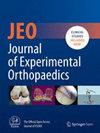Mechanisms and parameters of cryotherapy intervention for early postoperative swelling following total knee arthroplasty: A scoping review
Abstract
Purpose
Swelling after total knee replacement surgery can hinder recovery, cryotherapy is one of the non-pharmacological interventions. However, the evidence of effectiveness is limited, possibly due to the heterogeneity of parameters. This scoping review aims to summarise existing evidence, clarify the mechanism and effect of cryotherapy on swelling after total knee arthroplasty, and analyze various parameters, providing evidence for clinical practice and future research.
Methods
A literature search was performed on PubMed to include articles which reported on the cryotherapy impacts postoperative swelling after total knee arthroplasty. Snowballing research was used to obtain more sources.
Results
A total of 69 studies were identified from the initial research, of which 40 articles were included for the full text analysis. Cryotherapy primarily acts on swelling by reducing haemorrhage and inflammatory responses. The level of evidence for the effectiveness of cryotherapy is low, and there is no standard in its parameters. The initiation of cryotherapy is increasingly recommended to start immediately after surgery. The selection of treatment temperature needs to balance efficacy and safety, but measuring intra-articular temperature presents obstacles, making skin temperature a more feasible option. However, it is unclear how to achieve the desired skin temperature by setting a combination of treatment temperature, pressure and duration. When determining the length of the interval, particular attention should be paid to the changes in blood perfusion levels during the rewarming phase, as evidence suggests that skin temperature during rewarming may not accurately reflect the actual level of blood perfusion. The location and duration of cryotherapy can be preliminarily determined through existing evidence and mechanism analysis.
Conclusion
Some cryotherapy parameters are supported by evidence and can be practiced in clinical practice. It should be noted that skin temperature has limitations as an observation indicator during the rewarming stage, and the frequency of cold therapy needs further research to determine.
Level of Evidence
Level IV.


 求助内容:
求助内容: 应助结果提醒方式:
应助结果提醒方式:


